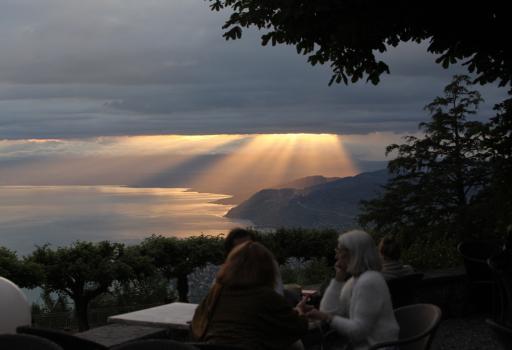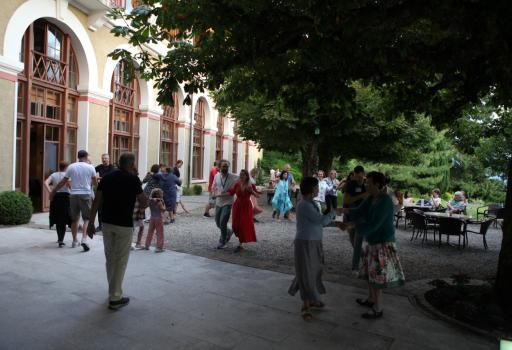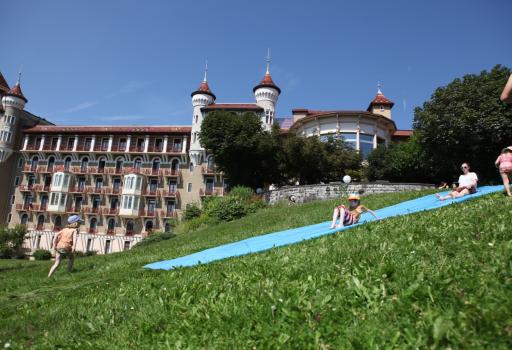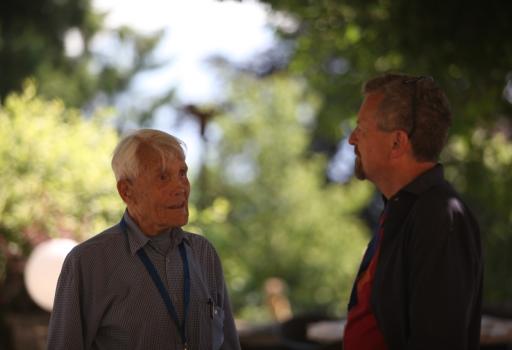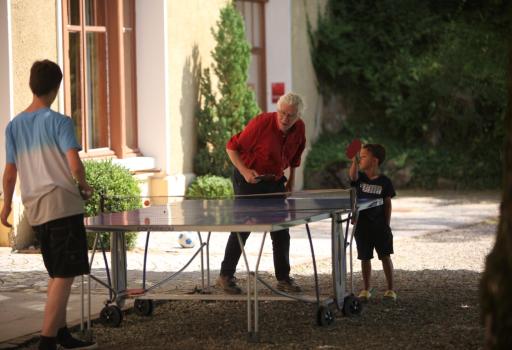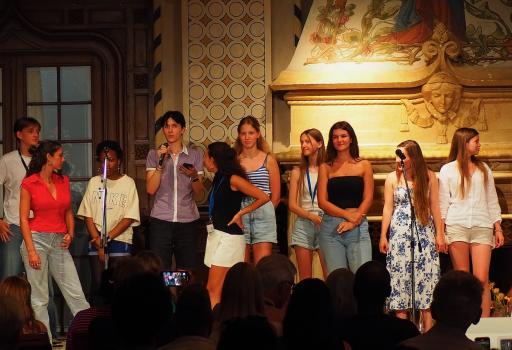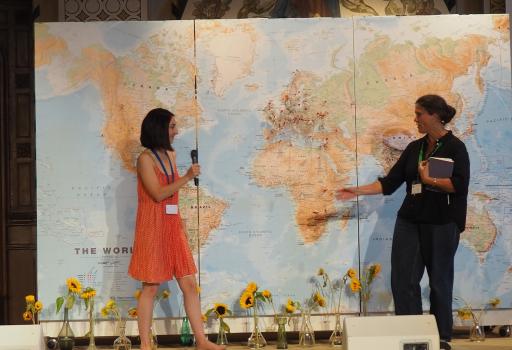Intergenerational Forum in Caux
BACKGROUND
The 2024 Intergenerational Forum in Caux, Switzerland, was modelled on the annual Initiatives of Change (IofC) Nordic Gatherings, which started in summer 2019, and the IofC Norway New Year’s Camps in Lia Gård, which have been running since 1990. The intergenerational theme for the Forum was inspired by a sense of urgency to bring the young and the old together to take time to listen, share, reflect, and discuss in the context of ongoing wars and conflicts in Europe and beyond – wars and conflicts that threaten community peace and solidarity across borders.
In keeping with IofC’s “be the change” philosophy, the Forum took a friendly across-the-table and personal approach in reflecting on values that have shaped Europe in the 19th and 20th century. The high-level topic on Day 2, “Europe’s seven deadly sins and the four standards”, invited participants to reflect and discuss, on a personal level, the seven deadly sins as stated in Christianity, namely, Pride, Greed, Wrath, Envy, Lust, Gluttony and Laziness, versus IofC’s four standards of absolute Honesty, absolute Purity, absolute Unselfishness, and absolute Love. For the next three days, the Gathering took a deeper dive into France’s national motto of “Liberté, égalité, fraternité”, pairing each respective value with Faith, Hope and Love, i.e., Freedom/Faith, Equality/Hope, and Community/Love.
WHO ATTENDED?
213 persons from 40+ countries, primarily Europe, participated in the gathering. Seven per cent were children aged up to six, seven per cent from seven to 14, eight per cent from 15 to 19, and the remaining 78% above 19 years old. The youngest attendee was less than one year old, while the eldest was 98. One attendee family spanned four generations while more than five families spanned three generations. Inge Rentzmann from Denmark pointed out that, “besides, the ‘biological’ family generations that were notable at the Gathering, there were also what one would call ‘country-level’ family generations that transcended biological relations.”
WHAT HAPPENED?
Partly due to budget constraints but mainly due to the tried and tested approach of earlier IofC Nordic gatherings, there were no “expert” keynote speakers as such. In this regard, the plenaries departed from the conventional Caux Forum plenary.
“It was a welcome change to be part of an event that was lightly structured, allowing space for very precious conversations in small groups (Communities) and to create self-organised conversations in the afternoon. It was good to intentionally ‘create space’ for ‘pending time with people’, in a time-poor world where ‘there is no time’.” – Mohan Bhagwandas, Australia
Regardless, the common thread at the start of each plenary, speaking to both young and old, and linking the day’s themes to the community groups discussions, was the character of the ‘Nordic Wonder Woman’. Thanks to her magic, young and old were not shy to either loudly sing along to some Nordic tunes or make some not-so-formal dance moves, sometimes bordering on the acrobatic.
“It was the atmosphere and sense of good-natured camaraderie that first struck me upon arriving. The venue of Caux Palace is breathtaking, of course, but it was the vibe of the people assembled for the conference that stood out. Warm and welcoming. The highlight for me, however, were the group meetings [community groups] every day. It is difficult to express the depth and insight shared within those moments. I hold that experience close to my heart still, as it has strengthened and fostered my burgeoning faith. My only mild criticism is that the Plenary session, while very interesting, needed to be more concise. Our family's experience at Caux has truly been a beautiful and enriching one.” – Ben, from the UK
It was a special joy and hope for the future seeing both children, teenagers and their parents enjoying the mix of generations – but also finding meaningful exchange and fellowship with their peers in the community groups for teenagers and for the young mothers and the young fathers.
It was the first coming together of old and new in the European IofC team since Covid-19, and an important step in reconnecting and restarting our European teamwork. Memories going back 50 years, and more were revived:
During the plenary session on Day 2, I had a strong sensation as Rajmohan Gandhi and Jens Jonathan Wilhelmsen spoke from the stage. This moment took me back 57 years to my first conference in Lundsberg, Sweden, where I met Jens and Rajmohan. Rajmohan had come to Europe to invite people to the opening of the first phase of Panchgani. Although several people went to Panchgani then, it wasn’t the right time for me. That conference was an awakening for me, leading to a night of reflection and drastic decisions. Seeing Rajmohan and Jens brought back those memories. A few years later, Rajmohan sent me a personal letter inviting me to be part of building phase 3 at Panchgani. – Antero, Sweden
One of the highlights for children (and some adults) was the IofC Germany-improvised water “rollercoaster” on the grass outside terrasse. On the last day of the Gathering, a few children were sad to leave, wanting the Forum to continue. Most of the participants have since stated in the evaluation survey that they would like to come back if another intergenerational forum was held in Caux or somewhere else in Europe.
WHAT NEXT?
A highlight of the final day was the talent show where, again, both young and old displayed their talents in song, dance, poetry, etc. The show was hosted by the “Nordic Wonder Woman” and dubbed, “The Show Must Go Home”, encouraging the participants to bring their experience at the Forum to their respective homes.
Indeed, a challenge for IofC’s work in Europe, Western Europe in particular, is the loss of actively relevant initiatives and work in our local communities. How does IofC grow these connections and roots into our societies again? How can IofC become a “counterculture” to the polarisation and fragmentation in our societies?
Becoming that real and relevant “counterculture” at home requires honest sharing, care, and community. The inspiration we saw taking form among us in Caux is a start. Hopefully, we will continue this at home, stay in touch, and meet again. This will help us keep each other inspired, accountable, and committed to “being the change”.
To this, Jens Jonathan Wilhelmsen from Norway noted:
“In my opinion, the week did a lot to unite those present in a common purpose and strengthen the faith that the purpose could become a reality” –
Johannes de Pous from the Netherlands added:
“No need to say how important it is to connect the European IofC teams more and the event in Caux has certainly been a success in that way. Let us see how this connecting can continue and be widened and deepened.” – Johannes de Pous
THANK YOU
Holding this Gathering was possible thanks to the Caux Foundation, the Hahnloser/Jaeggli Stiftung, the Irene Prestwich Fund, Eckbos Legat, IofC Denmark, and the Foundation for Spiritual & Moral Renewal (FSMR), who subsidised the lodging and conference facility costs by up to 40%. Thanks also to IofC Germany, IofC UK, IofC France and the Nordic IofC national bodies for their financial support to individual participants, as well as their voluntary contributions in terms of event planning and organisation.
